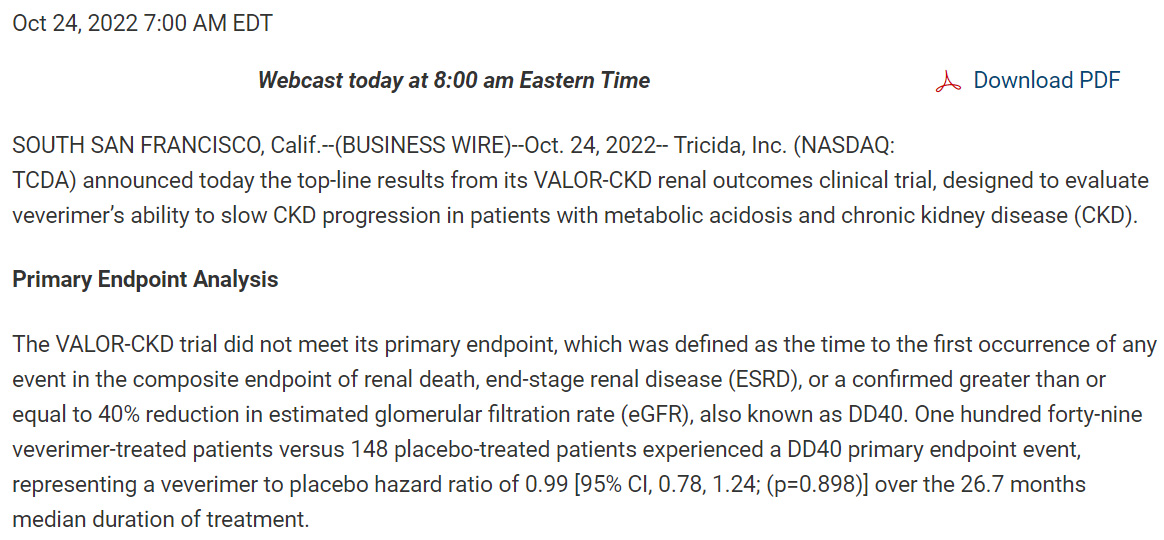On October 24, Tricida announced key results from the Phase III VALOR-CKD clinical trial, which was designed to evaluate the ability of veverimer to slow the progression of CKD in patients with metabolic acidosis and chronic kidney disease (CKD).
The VALOR-CKD trial did not meet its primary endpoint, defined as a ≥40 reduction in the composite endpoint (nephrogenic death, end-stage renal disease (ESRD), or proven glomerular filtration rate (eGFR; also known as DD40) to the first occurrence %) in any event. At a median treatment duration of 26.7 months, 149 subjects in the veverimer group and 148 subjects in the placebo group experienced the DD40 primary endpoint, indicating a hazard ratio of 0.99 [95% CI, 0.78, 1.24; (p=0.898)].
Affected by this news, Tricida’s share price plummeted 94%, and the current share price is only $0.668 per share.
Veverimer is a novel, non-absorbing polymer designed to bind hydrochloric acid in the gastrointestinal tract and eliminate it from the body through fecal excretion, thereby reducing the total amount of acid in a patient’s body. Veverimer is administered orally as a suspension solution.
Additionally, veverimer is specifically designed to bind and remove hydrochloric acid with high selectivity without transporting sodium or other ions, and thus may be a long-term treatment for patients with chronic kidney disease and common comorbidities such as hypertension, cardiovascular disease, heart failure or edema Potential therapy for metabolic acidosis.
The study was divided into two parts, and all subjects in the Part A lead-in period received veverimer treatment. The aim was to achieve a greater separation of serum bicarbonate (alkaline) levels between subjects in the veverimer and placebo groups during treatment.
Upon completion of Part A, 67% of subjects achieved an increase in serum bicarbonate of at least 4 mEq/L or an increase in serum bicarbonate to the normal range of ≥22 mEq/L. The 1480 patients had a mean increase in serum bicarbonate from baseline of 5.9 mEq/L (from 17.5 mEq/L to 23.4 mEq/L) and were randomized to Part B.
After 3 months, mean serum bicarbonate in the veverimer and placebo-treated groups decreased to approximately 22 mEq/L and 21 mEq/L, respectively, and remained at this level for most of the treatment period.
In addition, approximately 60% of patients in the placebo group had serum bicarbonate levels above 20 mEq/L at each 3-month time point between Part B months 3 and 30. Therefore, differences in serum bicarbonate levels between the two groups were insufficient to evaluate the effect of veverimer on slowing disease progression in patients with metabolic acidosis and CKD.
Dr. Gerrit Klaerner, Chief Executive Officer and President of Tricida, said: “Unfortunately, we were unable to compare the untreated acidosis population with the veverimer-treated population due to higher than expected serum bicarbonate values in the placebo group, and therefore were unable to assess vverimer slowdown. Capacity for CKD progression. Considering our past clinical experience with veverimer and the design of the VALOR-CKD trial, we were surprised to find no greater separation of serum bicarbonate levels between the two groups. Given the disappointing results of the trial, and Our cash levels, we are evaluating the next steps.”









